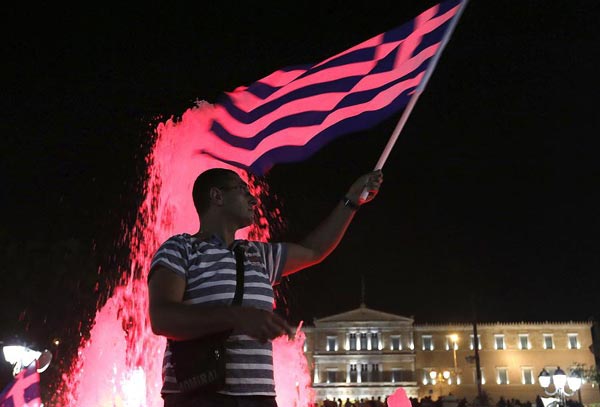Greece still cash-starved after decisive 'no' bailout vote
(Agencies) Updated: 2015-07-06 13:57
 |
|
A "No" supporter waves a Greek flag by the parliament in Athens, Greece July 5, 2015. [Photo/Agencies] |
Europe in talks
Key European leaders were regrouping. The Eurogroup - experts from the finance ministries of the 19 states that have adopted the euro - was set to meet. And EU Commission president Jean-Claude Juncker, Eurogroup President Jeroen Dijsselbloem and ECB President Mario Draghi planned to hold a teleconference to discuss the Greek case. A summit of Eurozone leaders was set to convene Tuesday afternoon.
In Greece, leaders of six of the seven parties represented in Parliament were meeting Monday morning in the presidential palace. Tsipras requested the meeting to share his negotiating strategy and call for support.
The main opposition party, New Democracy, was sending an interim chief, after its leader - former Prime Minister Antonis Samaras - resigned Sunday as "no" votes poured in.
None of these developments stopped jubilant government supporters' from celebrating into the night in Syntagma Square in front of Parliament, waving Greek flags and chanting "No, no, no!"
Tsipras was vindicated after gambling the future of his 5-month-old coalition government - and his country - in an all-or-nothing game of brinkmanship with Greece's creditors.
"Today we celebrate the victory of democracy," Tsipras said in a televised address, describing Sunday as "a bright day in the history of Europe."
"We proved even in the most difficult circumstances that democracy won't be blackmailed," he said.
Tsipras had vowed that a "no" vote would strengthen his hand to negotiate a better deal for his country. But European officials and most of Greece's opposition parties painted the referendum as one of whether the country kept using the euro currency - even though that was not the convoluted question asked on the ballot. Opinion polls Friday showed that 74 percent or more want their country to remain in the euro.
Tsipras told Greeks in his address that he would negotiate a viable solution with the country's creditors.
How European officials react to the referendum result will be critical for the country.
German Chancellor Angela Merkel and French President Francois Hollande spoke to each other Sunday night and agreed "that the vote of the Greek people must be respected," Merkel's office said.
Dijsselbloem, the Eurogroup head, said Sunday's referendum result was "very regrettable for the future of Greece."
The Dutch finance minister had been a steadfast opponent of Greece as it sought better conditions during five months of bailout negotiations. "For recovery of the Greek economy, difficult measures and reforms are inevitable," he said. "We will now wait for the initiatives of the Greek authorities."
Sigmar Gabriel, Germany's vice chancellor and economic minister, told a German newspaper the Greek government was leading its people "onto a path of bitter austerity and hopelessness."
Tsipras has "torn down the last bridges, across which Europe and Greece could move toward a compromise," Gabriel told the daily Tagesspiegel. "By saying 'no' to the eurozone's rules, as is reflected in the majority 'no' vote, it's difficult to imagine negotiations over an aid package for billions."
Belgian Finance Minister Johan Van Overtveldt was somewhat softer in his approach, saying a "no" result "complicates matters," but that the door remained open to resume talks immediately.
"What we certainly don't want to do is to take decisions that will threaten the monetary union," he told Belgium's VRT. "Within that framework we can start talks again with the Greek government, literally, within hours."
The international bailout - under which it received nearly 240 billion euros in rescue loans - expired last week.
- Greece enters uncharted territory after referendum 'no' vote
- EU loans to Greece may be possible
- Minister says confident in Greek crisis outcome
- Greece's future is written in coffee froth
- Infographics: What happens in Greece
- Greece's future is written in coffee froth
- Greece votes in referendum with future in euro in doubt
- ECB to keep tight funding grip on Greek banks after 'no'
- Too close to call as Greek referendum continues
- Greece in billions of financing gap over next 3 years






